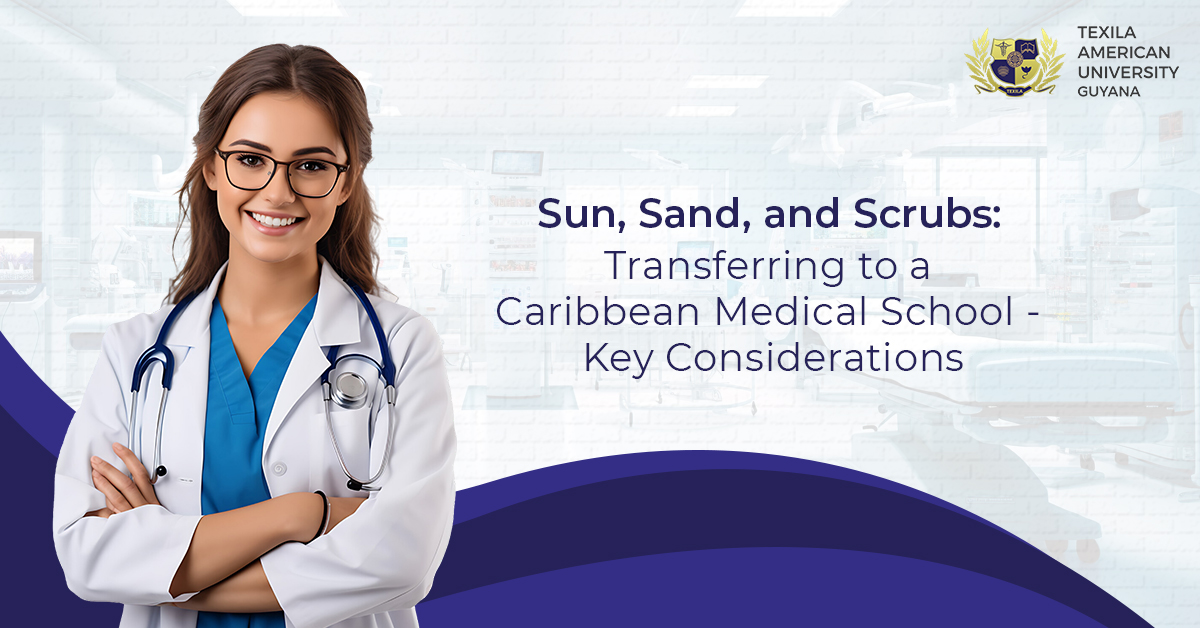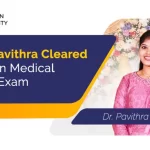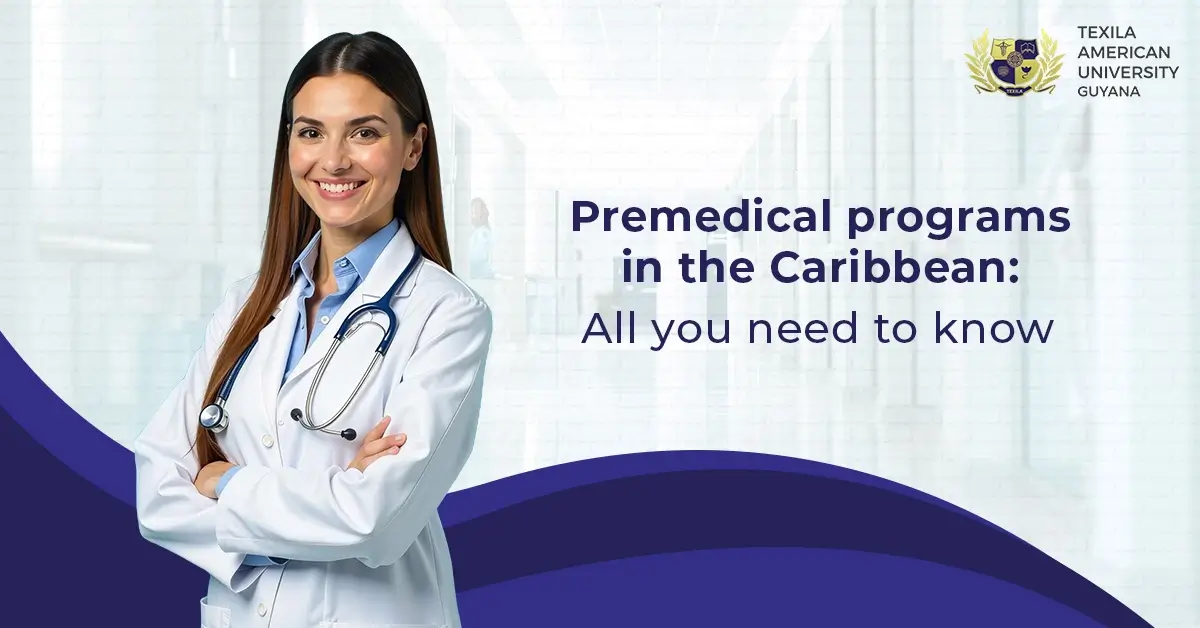Blog Summary
A transfer to a Caribbean medical school offers a blend of academic pursuit and tropical adventure. However, several key considerations must be addressed. First, ensure the school is accredited and accepts transfer students. Financial implications must be carefully weighed, including tuition costs and scholarship opportunities. Additionally, examine the institution’s track record on USMLE pass rates and residency match rates. Lifestyle adjustments and available support systems are vital for success in a new environment. It’s essential to conduct thorough research, seek insights from current students and alums, and explore alternative pathways to medical education. Ultimately, prioritize long-term career goals and aspirations when making this significant decision. With diligence and determination, aspiring doctors can navigate the complexities and reap the rewards of transferring to a Caribbean medical school.
Introduction
Are you dreaming of warm breezes, crystal-clear waters, and a medical degree? Transferring to a Caribbean medical school might seem like the perfect blend of academic pursuit and tropical adventure. But before you dive in, it’s crucial to understand the nuances and considerations of this decision. This comprehensive guide will explore critical factors when contemplating a transfer to a Caribbean medical institution.
Academic Credentials and Accreditation
One of the first steps in your journey is to assess the academic credentials and accreditation of the Caribbean medical schools you’re considering. Not all schools accept transfer students, so it’s essential to research each institution’s transfer policy thoroughly. Look into whether they accept coursework from your current institution and any minimum GPA requirements they may have. Without meeting these criteria, your dreams of island-hopping while studying medicine may be dashed before they begin.
Equally important is ensuring that the Caribbean medical school you choose is accredited by a reputable body recognized by the US Department of Education. Accreditation is not just a formality; it’s a crucial factor in determining your eligibility for residency placement back in the US. Without proper accreditation, you may face significant hurdles when it comes time to pursue postgraduate training.

Financial Considerations
While the allure of sandy beaches and turquoise waters may be irresistible, it’s essential to consider the financial implications of attending a Caribbean medical school. These institutions can be expensive, with tuition costs often rivalling those of US medical schools. In addition to tuition, you’ll need to factor in living expenses, travel costs, and the potential expenses associated with licensing exams such as the USMLE.
Researching scholarship and financial aid opportunities is crucial to mitigating the economic burden of attending a Caribbean medical school. While some schools may offer scholarships or financial aid packages, they may not be as generous as those available at US institutions. Additionally, consider the return on investment (ROI) of attending a Caribbean medical school. Graduates may face challenges matching into competitive residencies, which could impact their future earning potential. It’s essential to weigh these potential outcomes against the cost of attending.
Licensing and Residency Match Rates
Passing the United States Medical Licensing Examination (USMLE) is a non-negotiable step for practising medicine in the US, regardless of where you attend medical school. Before committing to a Caribbean institution, research the school’s track record for student success on these exams. High pass rates demonstrate the quality of education and preparation the school provides, increasing your chances of success on the USMLE.
Residency match rates are another critical consideration for prospective Caribbean medical students. Historically, graduates of Caribbean medical schools have lower residency match rates than their US counterparts. This discrepancy can be attributed to various factors, including competition for residency positions and perceived differences in the quality of education. Investigate the school’s support system for residency applications, including mentorship programs and networking opportunities, to maximize your chances of securing a residency position.
Lifestyle and Support Systems
Island living offers a unique cultural experience, but it also comes with its own set of challenges. Before transferring to a Caribbean medical school, consider how you’ll adapt to a new climate, potentially limited access to familiar amenities, and the overall lifestyle change. While studying under swaying palm trees may be appealing, adjusting to a new environment can be daunting.
Additionally, consider the support systems available as a student at a Caribbean medical school. Being far from family and established support networks can be challenging, particularly during the rigorous demands of medical education. Research the school’s student life resources, including counselling services, academic support programs, and extracurricular activities, to ensure you have the necessary support to thrive academically and personally.
Beyond the Checklist
When considering a transfer to a Caribbean medical school, it’s essential to go beyond the checklist and conduct thorough research. While glossy brochures and promotional materials may paint a rosy picture, hearing from current students and alums can provide valuable insights into the day-to-day realities of attending the school. Reach out to student organizations, alum networks, and online forums to connect with individuals who can offer firsthand perspectives on the institution.
It’s also worth exploring alternative pathways to achieving your medical career goals. Post-baccalaureate programs and retaking the MCAT are viable options for improving your competitiveness for US medical school admission. While transferring to a Caribbean medical school may seem like the quickest route to becoming a doctor, it’s essential to consider all available options and choose the path that aligns best with your long-term aspirations.

The Final Splash
Transferring to a Caribbean medical school can be a rewarding and transformative experience for aspiring doctors. However, it’s essential to approach the decision with careful consideration and thorough research. By evaluating academic credentials, financial considerations, licensing and residency match rates, lifestyle factors, and alternative options, you can make an informed decision that sets you up for success on your medical journey. Whether you ride the wave of Caribbean medical education or explore other avenues, the key is to prioritize your long-term career goals and aspirations. With diligence and determination, you can chart a course that leads to fulfilment and success in medicine.
Conclusion
The decision to transfer to a Caribbean medical school is significant, requiring careful evaluation of numerous factors. From academic credentials to financial considerations, licensing and residency match rates, lifestyle adjustments, and exploring alternative pathways, aspiring doctors must consider their options. While the allure of tropical surroundings may be tempting, it’s crucial to prioritize long-term career goals and aspirations. By conducting thorough research and seeking insights from current students and alums, individuals can make informed decisions that align with their ambitions. Whether opting for a Caribbean medical education or pursuing alternative routes, dedication and perseverance are paramount.












